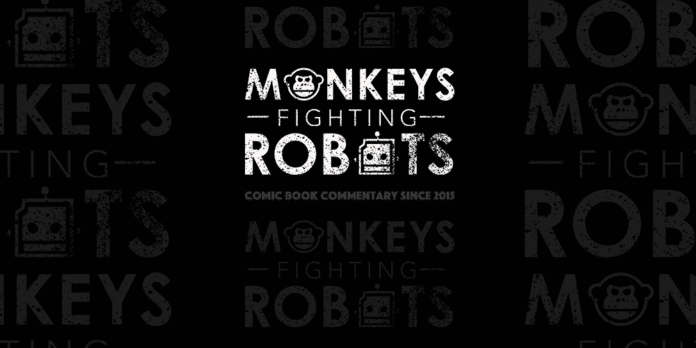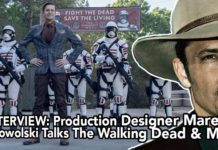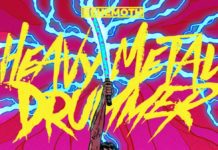If you ever watched TV over the past 10 years or so then you’ve heard David Norland’s music because he’s worked on things like 20/20, Good Morning America, The View, and Anvil! The Story of Anvil.
Monkeys Fighting Robots spoke with David Norland about his career in making music for the pop scene, TV, film, and My Dinner with Hervé.

Understanding and Inspiration
David certainly understood music from an early age “I came from a musical family. My dad was a clarinet player in the Royal Air Force. My mom was an aspiring opera singer. I was that kid who played the piano, played the flute, sang in a choir. By age twelve I was taking composition lessons.”
His parents were his first inspiration but “I had this amazing music teacher … he had us all choose a note at random and sing it as loud as we can. On his command, we would switch to another note. It became a chorus of tonal clusters. I was knocked out by the possibilities of sound.”
David shares another story “I remember when I wrote my first composition, the teacher said ‘What are you doing, you just copied Vivaldi?’ I was really crestfallen, but it really made the point to me that we should keep pushing forward. “The great challenge in music is to keep making new things.”
From Solar Twins to Scores
After a life learning music, David journeyed down the pop music road first “The arc of how I came to be doing what I do … in my early years, I was in bands. A band called Solar Twins got signed to Maverick Records. Our first record got a little bit of attention. But as a result, I started getting asked to do little bits and pieces for TV commercials. I absolutely loved it.”
The versatility of David’s background allowed for many possibilities “I already knew how to produce music. Pop music was changing … and I had classical music training from when I was young too. Making music for pictures seemed to incorporate all the things I can do in the service of telling a bigger story.”
The jump to film came next “A friend of mine from school [Sacha Gervasi] was making a move from writing films to directing, so he asked me to make music for his first film.” The documentary called Anvil! The Story of Anvil was only the beginning “We developed this beautiful, creative relationship around our friendship.” Together the pair has worked on several films.
After Anvil! “I got a call out of the blue from an ABC executive who heard the score for Anvil. They asked if I’d come work for them.”
Dinner Time
For those not in the know, My Dinner with Hervé is a film made for HBO about the life of diminutive TV superstar Hervé Villechaize played by Peter Dinklage (Game of Thrones) who starred in hit 70s TV show Fantasy Island. David says “It’s a great story. Sacha … interviewed Hervé Villechaize just before the actor committed suicide. At that point, Herve had lost his stardom … the story follows his extraordinary life.”
A part of the life is “… the classic Hollywood story of excess and hubris, Hervé lost it all.”
The birth of the story happened somewhat spontaneous as Sacha went to meet with Hervé and it turned out to be much more than expected “Sacha spent a night around L.A. with Herve who told him this story of his life. Sasha spent the next 20 years trying to get this movie made. I’ve watched him go through the process as the film has developed and the script has developed. To be a part of it now as it comes to fruition is magical.”
Though it has a tragic end, Hervé’s life was something special “It’s a wonderful film that takes us on such a journey; from post-war France, through 1950s New York, through 70s and 80s Hollywood excess. It’s a real trip.”
The Process
Friendship and working relationship makes for a more intimate filmmaking process “When I work with Sacha, one of the great things about it is that I get to see the script. And I start writing. So I get to develop the sound along with the script as it’s evolving.”
As pre-production moves, so does the score “By the time Sacha went to shoot the film, I had already written some fully-realized pieces.”
The process continues on during production “I send him stuff, he listens to it, some of it flies, and some of it doesn’t.”
What’s the value of this process? “It allows the music to germinate organically as the film is developing. Rather than, here’s a month to come up with whatever you can come up with. The other great thing is I get to sit in on the editorial process and understand the decisions that Sacha is making and how his storytelling technique is coming together.”
Wrapping Up
After a decade of making music for TV and film, David is going back to the record business “I’m working on a new record. However, it’s music that would fit in nicely into some movie or TV show. It’s piano and strings, stuff like that.”
We talk one of his old influences “One of the most influential film scores, for me, was Ennio Morricone’s work on Once Upon A Time in America.”
As for composers working today “Chris Clark … fabulous score for a crime show called Rellik … super-innovative. I’m a huge fan Hayao Miyazaki’s work. Spirited Away is one of the most beautiful movies ever made. Haiyo works with Joe Hisaishi whose music is wonderful.”
Movies are 2D experiences and music fills in the remaining space “Absolutely. Sound is another dimension that, I think, brings movies into the cinematic realm.”
David’s final thoughts on his career thus far? “The beauty of it is that I get to go to my studio every day and make music and people pay me.” That’s called, living the dream.
Thanks to David Norland and Impact24 PR for making this interview possible.








